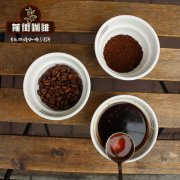Background story of coffee manor in Rosa Village how much is a cup of coffee in Rose Village

Professional coffee knowledge exchange more coffee bean information please follow the coffee workshop (Wechat official account cafe_style)
The highest quality and most primitive Coffee-background Story of Coffee Manor in Rose Summer Village of Gesha Village
The Gesha Village tour began in 2007, when Mr. Adam Overton and Miss Rachel Samuel were making a documentary about Ethiopian coffee for the Ethiopian government. In this work, they first introduced Dr. gima and followed the guide through the KAFA Coffee Forest near djimman. Dr. Girma is a coffee researcher who studies coffee agriculture and farm management. In the process of making the documentary, Rachel Samuel was brought back to her birthplace, Ethiopia, where Adam Overton was fascinated by the rich coffee history of her birthplace.
After the coffee expedition, the couple deeply felt that they had to start their own coffee farm. They see too much unexplored potential and opportunities in the wild coffee forests of Ethiopia. Despite the maturity of the country's coffee trade, Ethiopia's coffee industry lags far behind new sources of coffee in terms of agricultural and processing innovation and local differences, which are the two most important differences between professional boutique beans and commercial beans. Adam Overton and Rachel Samuel make full use of the Ethiopian professional market to establish Kuixia Village, which is different from the tradition.
From 2007 to 2010, the couple looked for the perfect place to build their village in the country. The original standard was that due to actual transport considerations, the farm should be close to the capital, Adis Abysya. More importantly, other considerations are:
Altitude: 1800-2100 m above sea level
Larger land (over 100 hectares)
There are many old trees / virgin forest
Rich shade of trees
Access road
A sufficient labor force
Residents do not have displaced and stable labor resources
As they investigate the places, they are getting farther and farther away from the capital of Adis Abyssia. Finally, they found Gesha town, very close to Ethiopia's border with Sudan, in the far western region of the country. Finally, they found the town of gesha, which is very close to the border between Ethiopia and Sudan, in the southwest of the country. During their reconnaissance, they found wild coffee growing within pristine forest. In the course of their reconnaissance, they found (wild coffee) growing in the virgin forest; This coffee paradise, combined with meeting some inhabitants from the Meanit community who indigenous to the area, also drew the couple in. This was a place and people where something completely cutting-edge could happen. Such a coffee paradise.
Some residents of the area also attracted the couple. This is a (local) and (people) where some good things can happen.
In autumn of 2011 the lease for the 471hectares that now make up Gesha Village Estate was signed and soon after, Akalu, Gesha Village's (GV) Farm Manager was hired. In the fall of 2011, the 471 hectares of land that now make up gesha Village was contracted, and soon after, gesha Quesha Yiji Village Farm hired Akalu as manager. He, together with the newly established GV team, began doing a forest exploration where they picked wild seeds from the nearby Gori Gesha forest. Together with the newly formed GV (gesha village) team, he embarked on a forest expedition to collect wild seeds from the nearby Gori Gesha forest.
After a year in the nursery, these seeds were planted on 30 hectares and at the same time, the team began acquainting themselves with the Meanit neighbours that lived around them. After a year in the nursery, the seeds were planted on 30 hectares of land, while they began to get acquainted with their neighbors. This initial 30 hectares made up GV's first "test plot"-the team wanted to ensure the cup quality was good before more coffee was planted. The initial 30 hectares make up the first "experimental farm" for GV (gesha village)-the team hopes to make sure the quality of the cup test cup ping is good before more coffee is planted. The first 1kg sample was sent to Adam and Rachel's friend Willem Boot in the spring of 2012 even before they themselves had a chance to cup.
In the spring of 2012, the first 1kg sample was sent to Adam and Rachel's friend William Bout (Willem Boot), even before they had a chance to cup ping themselves. Willem in turn organized a Cupping Caravan in Ethiopia where cuppers were blown away by the coffee. William organized another cup ping Alliance in Ethiopia, and the coffee sample was taken away. At this point, the GV team knew that they were onto something special. At this point, the GV team knows that they are becoming special and that something good is happening.
Before getting too ahead of themselves, the team decided to visit their neighbours' coffee farms in order to both study the morphology of more established trees, which also came from forest seeds, and also to cup their neighbours' coffees to further understand what they were working with at GV. Before going any further, the team decided to visit the neighbor's coffee farm to study the morphology of more trees, which also came from forest seeds, and to test the neighbors' coffee to learn more about how they were managed.
As exciting as cultivating forest coffee was, the team understood that planting one of any variety was risky and on the advice of Akalu and Dr. Girma, decided to plant a good portion of GV with tried and tested Ethiopian heirloom varieties released from the Jimma Argicultural Research Center (JARC). As exciting as growing forest coffee, the team learned that growing any variety was risky and, at the suggestion of Dr Akalu and Girma, decided to plant a large number of GV (GESHA VILLAGE), including the time-tested Ethiopian heirloom Variety Research Centre (JARC) developed from Jimma Argicultural. These released varieties come from various seed collection expeditions that JARC has conducted. These released varieties came from various seed collection investigations conducted by JARC.
Studying wild species collected during the expedition, the researchers looked for the following characteristics when determining which "good plants" were:
A) obvious disease resistance; b) excellent cup quality
B) excellent cup test quality; and c) good yield.
C) good earnings.
Plants showing these characteristics are chosen for release and GV chose to plant a variety that originated in the highland coffee forests of Illubabor. The plants that showed these characteristics were selected, and GV selected a variety of plants that originated in the highland coffee forest of Illubabor.
This one showed both disease resistance and excellent cup quality. This one shows disease resistance and excellent quality.
We can say that over the course of cupping the different varieties produced on GV, these research varieties have some of the most exciting cup profiles that Gesha Village have produced. We can say that in the process of cup testing of different varieties produced by GV, these studied varieties have some of the most exciting qualities produced by Gesha Village (Rosa Village Coffee). With varieties playing such an important role in quality and cup profile, it makes perfect sense that the GV team found research partners to carry out a methodical genetic study on the Gesha forest varieties. As varieties play such an important role in quality, the GV team has found a research partner to conduct systematic genetic research on Gesha forest varieties, which is of great significance. Part of that study concerns the possible connection between Panamanian geisha and coffee from the Gori Gesha Forest.
Brand recommendation of coffee beans in Guoxia Village
Qianjie Coffee roasted Rose Village Coffee beans-Rose Village Sun Rose Summer Coffee is fully guaranteed in brand and quality. And more importantly, the performance-to-price ratio is extremely high, a pack of half a pound 100 grams, the price is only 150 yuan. According to the calculation of 15 grams of each cup of coffee powder, six cups of coffee can be made in a bag, which costs only about 25 yuan per cup, which is very cost-effective for coffee shops to sell hundreds of yuan a cup.
Qianjie coffee: Guangzhou bakery, the store is small but a variety of beans, you can find a variety of unknown beans, but also provide online store services. Https://shop104210103.taobao.com
Important Notice :
前街咖啡 FrontStreet Coffee has moved to new addredd:
FrontStreet Coffee Address: 315,Donghua East Road,GuangZhou
Tel:020 38364473
- Prev

What is the difference between Yejia Xuefei washing and sun-drying raw beans? [washing] and [sun Yega]
Professional coffee knowledge exchange more coffee bean information please follow the coffee workshop (Wechat official account cafe_style) Yega Xuefei washing and sun-dried beans what is the difference? What is the difference between [washing] and [sun Yega] flavor trend? According to the map, Yega Xuefei is just a by-product area with the highest elevation leaning against mountains and water in Ethiopia's Sidamo Sidamo province. Because of
- Next

What kind of Rosa Coffee Bean in Rosa Village? how much is the price of Rosa Coffee Bean in Rose Xia Village
Professional coffee knowledge exchange more coffee bean information please follow the coffee workshop (Wechat official account cafe_style) Why is it so important to go back to Ethiopia to find out the source of Rosa coffee varieties? For WillemBoot, if you can find coffee that tastes as good as Panamanian roses,
Related
- Detailed explanation of Jadeite planting Land in Panamanian Jadeite Manor introduction to the grading system of Jadeite competitive bidding, Red bid, Green bid and Rose Summer
- Story of Coffee planting in Brenka region of Costa Rica Stonehenge Manor anaerobic heavy honey treatment of flavor mouth
- What's on the barrel of Blue Mountain Coffee beans?
- Can American coffee also pull flowers? How to use hot American style to pull out a good-looking pattern?
- Can you make a cold extract with coffee beans? What is the right proportion for cold-extracted coffee formula?
- Indonesian PWN Gold Mandrine Coffee Origin Features Flavor How to Chong? Mandolin coffee is American.
- A brief introduction to the flavor characteristics of Brazilian yellow bourbon coffee beans
- What is the effect of different water quality on the flavor of cold-extracted coffee? What kind of water is best for brewing coffee?
- Why do you think of Rose Summer whenever you mention Panamanian coffee?
- Introduction to the characteristics of authentic blue mountain coffee bean producing areas? What is the CIB Coffee Authority in Jamaica?

